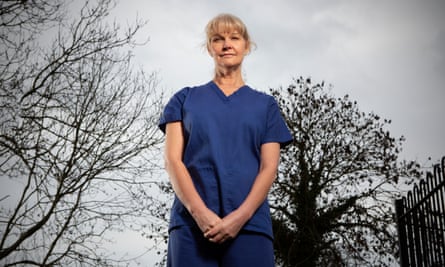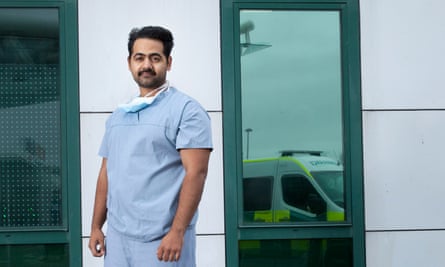Dawn Bilbrough, 52, critical care nurse from York, works in Leeds
Midway through the afternoon on Thursday 19 March, Dawn Bilbrough, a critical care nurse of 20 years, was on her way home after four punishing days of 12-hour shifts. Stopping to get fresh food at the supermarket, she found the shelves empty, and people walking around in a daze, “just stunned”. By the next morning, on her work break still in her scrubs, she was on ITV’s This Morning.
“I’m quite introverted, normally,” she says, of the video she posted to Facebook, in her car, that quickly went viral, “but I felt really strongly about what I’d just seen”. In the video, she breaks down in exhaustion and frustration at the aftermath of panic-buying. “You need to stop it,” she says, her voice breaking, “because it’s people like me who are going to be looking after you.”
About 27,000 people shared the emotional, 52-second clip Bilbrough recorded; four days later, lockdown was announced. March is always a difficult month for the NHS even without Covid-19, Bilbrough says. “I don’t think the public realise how very challenging the winter pressures are every year. We’re exhausted by then.” This year, though, she’d been watching footage from Italy, and her team were having training sessions after hearing about London hospitals being badly affected. Nevertheless, it still felt like Covid hit overnight. “Areas were suddenly no-go, doors were locked, tape being put across places. There was a lot of apprehension and fear.”

Things “went wild” after Bilbrough’s post and she has a publicist now to field press requests so she can stick to her work. But she does not regret it. “It felt the right thing to do and it still does. We need to keep talking about how we’re feeling as NHS workers, how it’s affecting us.” She’s received many messages from strangers through the year, including ones from former panic-buyers who hadn’t realised the impact of their actions. Her newfound fame isn’t discussed at work, though. “We occasionally have a bit of a giggle, but then it’s back to it.”
She’s still speaking out, she says, because the NHS is “at a very low point again now”; lessons have been learned in how to treat some aspects of the disease, and teams are coordinated well, but she’s frightened about how many people are desensitised to the risks. “And even now the label is still sticking that only adults who are vulnerable get it, which just isn’t true. But even if they are vulnerable, then so what? These people are still people. Every life matters and the NHS matters. We want to help everybody.”
At the year’s end, Bilbrough’s life outside work also remains very different from how it was before. On her days off, she tries to look after herself by exercising, eating healthily and speaking to friends and family on video calls. But she still doesn’t hug anyone, she says, and at this, her voice breaks. “Sorry. I’m sorry. But it’s been tough not to have that contact. We’re not robots. We have emotions. We’re still human beings.”
Karan Rajan, 30, surgeon from Hampshire, works in London

On Sunday, 5 April at 4am, Dr Karan Rajan was on the last break of his night shift, looking at his surgical gloves, when he decided to post a video on TikTok. The previous day he had noticed lots of people wearing them in the supermarket, thinking they were protecting themselves when instead they were running the risk of picking up and transmitting Covid-19.
He started speaking into his phone camera, effusive in his scrubs, cap, gown and lanyard, dotting his glove with lines of ballpoint pen to show the effects of touching everything: “Your glove is now more full of germs than your hand would have been.” “Spread knowledge not the virus”, ran the text displayed over his image. Spread it did: it’s now had more than 1m views, and he has 2.2 million followers.
Rajan was not a newcomer to social media when his video went viral. He’d been posting videos to Instagram to help medical trainees with assessments for exams for a few years, and after signing up to TikTok in late 2019, started posting videos about “crazy medical facts, like how the human stomach produces an acid that can dissolve razor blades”, he says, smiling. He’d also started releasing short videos to help combat conspiracy theories and misinformation about science, health and medicine – “something that’s very important to me” – but the one about gloves kicked off a busy extracurricular career.
He has been a guest on Good Morning Britain, and is now working on projects with the Red Cross. Colleagues “have a laugh” when they’ve seen him on TV, but when patients recognise him in hospital, they usually message him on social media later. (“Everyone seems to be so British like that, but I really don’t mind people coming up to talk to me.”)
Rajan spent the early part of the first wave calling patients to postpone non-urgent surgical procedures, which he says was hard, but if people had needed an emergency bed after a procedure, there wouldn’t have been one. During that time he worked in emergency surgical services, but had to change working practices quickly, moving away from keyhole surgery to open surgery, for example, as Italian research showed it produced fewer Covid transmission risks. He also pitched in at A&E. “So many people were doing lots of 12-hour shifts,” he says. “It was tough.”
He got Covid-19 in April too, at the start of a week off, and although he recovered quickly, he has had long Covid symptoms, including post-viral fatigue; he only felt normal again a month ago. Covid has changed him in other, profound ways. In the summer, seeing so many close friends become ill, and hearing stories of young people whose family members had died, he felt moved to go back and live with his parents in Hampshire; he’s an only child, and they’re “more than keen” to have him around. “On some level, this year’s made me want to see my parents every day coming home, and before leaving for work in the morning, to have that contact. It’s reminded so many of us how important we are to each other.”
Natalie Silvey, 35, anaesthetist from West Midlands, works in London

On Saturday 21 March, Natalie Silvey was in a cab coming home from work, and was shocked by the crowds on the streets. “The incongruence of seeing people having normal Saturday nights with what I’d just experienced … it makes me emotional even talking about it now.”
In the previous nine hours, Silvey had been in full PPE transferring two intubated Covid-19 patients out of an overwhelmed hospital to relieve the pressure. She’d volunteered to do this shift outside her normal working patterns in response to an urgent NHS request. Back at base, she’d had a shower, then caught sight of herself in the hospital mirror, seeing deep welts on her face. “I basically took a photo to show my mum because it looked so ridiculous.”
In the cab, “a crying mess”, she tweeted it as part of a thread (“I feel broken – and we are only at the start,” she said). An hour later, she returned to her phone with a cup of tea, and her best friend had texted her the words “Nicola Sturgeon”, without context. Thousands of people, including Scotland’s first minister, had retweeted her thread already. “I was all, oh holy… I wasn’t expecting this. Do I delete it? But the genie was out of the bottle.”
Silvey’s colleagues were “very positive” about her post, however. “They said it was good timing, and it did seem to raise the right kind of awareness.” On Twitter, she’s now got 26,000 followers, which she finds “a bit mad”, but she tweets as she did before the pandemic, commenting on things happening in work and her regular life (such as where she’s left her glasses).
With 10 years’ experience behind her, Silvey was redeployed into intensive care units during the first wave. Very early on, she decided not to see her family, including her heavily pregnant sister, who had a daughter on 13 March, to whom she’s very close. “I’ve written a letter for my niece telling her why there are no pictures of me holding her when she was little,” Silvey says. She also wrote a will back in March, on NHS advice, leaving everything to her niece. Back then, she says she “felt very scared going into work every day”.
Then in early April, Silvey got Covid-19, despite adhering to scrupulous PPE decontamination measures (she wonders if she got it on the tube, while travelling to work). She felt “very unwell” and “very guilty to let the team down”, but after recovering, she stayed redeployed until June. She had to get to know patients from letters and photos pinned to the walls, rather than family visits, which was tough. Each morning, purple hearts placed outside intensive care alerted her to the patients who had been discharged. Many may be still suffering from long Covid symptoms, she says. Others didn’t survive. “I signed off many deaths, and I won’t forget those people… each of them is someone’s son, daughter, mother, father, grandparent.” We mustn’t forget this is still happening, she says. “It’s frightening that so many people still diminish that impact.”
In November, she moved hospitals, and is now working on elective surgery. She’s “very proud” of how the NHS is managing to keep that work going in this “awful second wave. It’s very important,” she adds. “Imagine being in horrible pain earlier this year, and having your operations postponed continually.” It’s been a year that’s gone quickly to her but she does feel a ray of positivity with the news of vaccines. “It’s very hopeful, amazing, especially as we didn’t really know anything about Covid-19 a year ago.”
